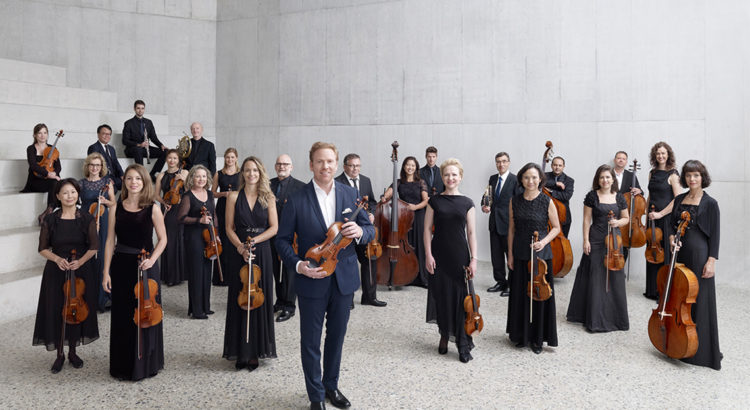Without a doubt, I can honestly say that the Zurich Chamber Orchestra’s performance of Antonio Vivaldi’s The Four Seasons and Max Richter’s Vivaldi Recomposed was one of the top five performances I’ve ever been to in my life. Their musicianship was incredible, but it was also clear to everyone in the audience that the performers were enjoying playing the music as much as the audience was listening to it!
I’ve listened to The Four Seasons, which is a set of four violin concerti, many times, but I had never heard it performed live prior to this concert. That said, I noticed all kinds of details about the music in person that I never would have noticed on the recording. I especially enjoyed watching the lute player, since this is not an instrument usually found in modern orchestras. The concerti comprising The Four Seasons were performed in succession prior to intermission.
After the intermission, the stage lights were dimmed, with blue lights and a pattern projected on the back of the stage behind the performers. This set the mood for Max Richter’s recomposition of the piece that preceded the intermission (you may be familiar with Max Richter through his work composing film scores, including Arrival, Mary Queen of Scots, and Ad Astra). In fact, during the introduction of the piece, I learned that Max Richter composed Recomposed: Vivaldi – The Four Seasons specifically for violin soloist Daniel Hope – music director of the Zurich Chamber Orchestra and the very soloist for the concert! According to Mr. Hope, Max Richter’s problem with the original is not with the music, but with our treatment of it. “We are subjected to it in supermarkets, elevators, or when a caller puts you on hold,” he explains in the program notes. Furthermore, “Mr. Richter’s reworking meant listening again to what is constantly new in a piece we think we are hearing when, really we just blank it out.” To me, this reasoning for recomposing The Four Seasons makes a lot of sense to me (if I may, it struck a chord…). In fact, only a few weeks ago I made a phone call where the hold music was … you guessed it, The Four Seasons. Listening to Max Richter’s adaption, however, forces audiences to hear the centuries-old piece that it is based on with new ears. It expands and contracts recognizable segments of the original work, while simultaneously blending new elements. The composition, which challenges listeners at every turn, is truly a work of art.
To close an evening of exceptional music, the Zurich Chamber Orchestra played four encores! Even after the encores, however, I wasn’t ready for the concert to end. I would have been happy to stay in my seat and listen to them play beautiful music for several more hours. The first encore was from a Vivaldi double concerto for two violins, but the ensemble completely switched gears for the next two, showcasing their versatility with George Gershwin’s I Got Rhythm and Kurt Weill’s September Song. Finally, after countless standing ovations, Mr. Hope returned the stage to play an unaccompanied rendition of Brahms’s Lullaby, to laughter from the audience. At the piece’s conclusion, he walked off the stage, still playing while doing so, and then waving. As the audience filtered out of the auditorium, the performers still onstage exchanged hugs with each other, an expression of the joy that their music brought!


